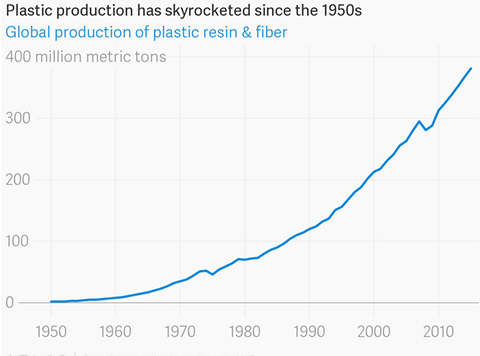The trade war is having no effect on China´s economy.
As reported by Forbes:
‘The Trump vs Xi Jinping trade war has not harmed China’s trade economy, based on recent trade data for August and the first week of September. Total trade activity climbed 12.9% on an annual basis in August in yuan terms, up from 12.5% in July. That marked the 22nd month of growth, Panjiva research analysts said this week.
‘This is not because of a weaker yuan.
‘In dollar terms, total trade grew 14.3% including an export expansion of 9.8% which beat market expectations of 7.8%, according to S&P Global Market Intelligence.’
So far, the US has applied tariffs on US$50 billion of Chinese imports.
China´s response has been to do the same.
The latest lot of tariffs from China, amounting to US$16 billion, is mostly rubbish. What I mean is China has imposed tariffs on waste material like plastic, paper, metals and aluminium.
You see, the US exports quite a lot of its garbage…and until this year China was one of the big importers. According to the Institute of Scrap Recycling Industries (ISRI), in 2016 the US exported US$5.6 billion in scrap to China.
Scrap may not be getting as much press as whisky and Harleys in this trade war…but it should.
The Recycling Industry is Already in Trouble
Just to give you an idea, US scrap exports to China dwarf some of the trade war’s ‘big ticket’ items. Take soybeans: in 2016 the US exported US$1 billion in soybeans to China. Or pork…US pork exports to China in 2016 were worth US$713 million.
The new tariffs will make it more expensive for China to import waste material from the US to recycle.
Yet this comes at a time when the recycling industry is already in trouble.
You see, most of the large recycling companies don’t recycle locally. Instead, they are more like sorting facilities. They collect your waste, sort it at local centres and then sell it off to China. Once it gets to China, there is not much data on what happens to it.
Yep, Americans may be sorting their garbage every week but that doesn´t mean it is getting recycled.
The old set up worked relatively well for both the US and China. China brought in boats full of stuff to sell and then boats left full of scrap to China to produce new things.
Yet now China doesn´t want any more foreign garbage.
China started placing restrictions on scrap imports this year in a push to improve the environment. The ban affected paper and plastics in particular.
The country is planning to ban all solid waste imports by 2020.
As ISRI reported:
‘As part of China’s environmental protection drive, the government implemented on January 1, 2018, a ban on scrap plastics from household collections and unsorted, mixed paper from all sources, affecting more than $500 million of exports to China. Then, on April 19, 2018, China announced the intent to ban all plastics, small electric motors and insulated wire by the end of 2018 and stainless steel and other metallic scrap by the end of 2019. This will affect an additional $446 million of U.S. scrap exports.’
Yet the US recycling industry is getting hit with a double whammy: the ban and the recent tariffs.
Since the ban, US recyclers have been looking to find other markets, places like Vietnam, India and Malaysia. Yet these countries could struggle to absorb the amount of scrap China used to take in. And, it could make recycling more expensive, as there aren’t as many ships going to those countries as there are going to China.
In fact, Vietnam and Malaysia are both already restricting waste imports. [openx slug=inpost]
China Urged to Lift Ban
Back in March, the US urged China to lift the ban…but China has stayed put.
With no buyers, US recyclers are now either accumulating trash or sending it to landfill.
As News 18 reported:
‘The Waste Management facility in Elkridge manages to sell its plastic bottles to a buyer in South Carolina and ships its cardboard abroad.
‘But its haul of mixed paper and mixed plastics is effectively worthless, and the plant pays subcontractors to haul it away.
‘Other US recycling plants have broken a major taboo and no longer bother sorting plastic and paper, and instead simply send it straight to landfills.
‘“Nobody wants to say it out loud, because nobody likes the fact that they’re having to do it,” said Bill Caesar, the head of waste company WCA in Houston.
‘Waste Management and Republic Services, another industry heavyweight, have admitted doing it under limited circumstances, while some small towns, particularly in Florida, have simply stopped collecting recyclable waste.’
The global economy is producing more waste.
Long gone are the days where domestic appliances and electronic devices last decades. Today you are lucky if you can get a few years before they break or become obsolete.
The same goes for plastic. As you can see in the graph below, we are producing a lot more plastic than 70 years ago, and much of that is plastic we use once and throw away.
 |
Source: Weforum |
After years of sending scrap abroad, the US has two alternatives, it can either look at other buyers to take their trash…or start a recycling program themselves.
Meanwhile, some Chinese companies are seizing the opportunity and betting on the latter.
Since the Chinese ban on foreign trash some Chinese recyclers have been scooping up paper mills and plastic recycling locations in the US.
Best,
Selva Freigedo





